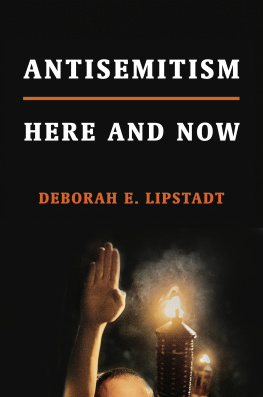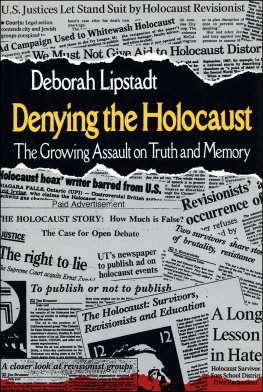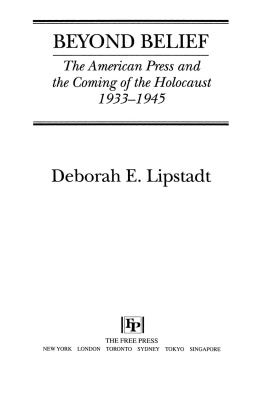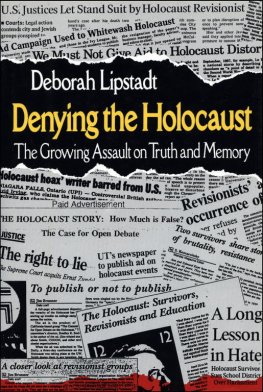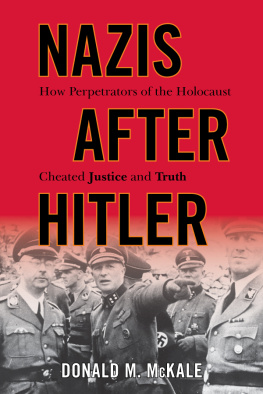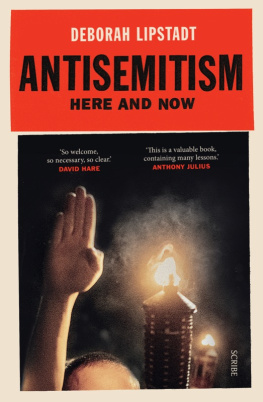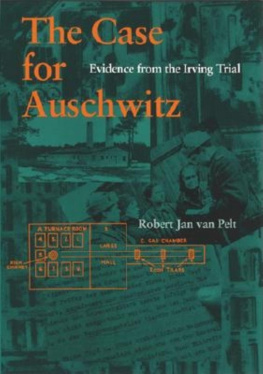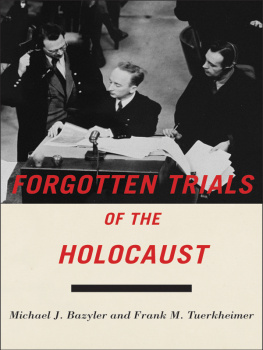I n 2010 I was first approached by the BBC and Participant Films to adapt Deborah Lipstadts book History on Trial for the screen. My first reaction was one of extreme reluctance. I have no taste for Holocaust movies. It seems both offensive and clumsy to add an extra layer of fiction to suffering which demands no gratuitous intervention. It jars. Faced with the immensity of what happened, sober reportage and direct testimony has nearly always been the most powerful approach. In the Yad Vashem Museum in Jerusalem, I had noticed that all the photography, however marginal and however inevitably incomplete, had a shock and impact lacking in the rather contrived and uninteresting art.
It was a considerable relief on reading History on Trial to find that, although the Holocaust was its governing subject, there was no need for it to be visually re-created. In 2000 the British historian David Irving, whose writing had frequently offered a sympathetic account of World War II from the Nazi point of view, had sued Deborah Lipstadt in the High Court in London, claiming that her description of him as a denier in her previous book, Denying the Holocaust, had done damage to his reputation. In English courts at the time, the burden of proof in any libel case lay not with the accuser but with the defendant, compared to the United States where it was the litigants job to prove the untruth of the alleged libel. It was for that very reason that London was Irvings chosen venue. He had thought it would make his legal action easier. All at once, an Atlanta academic found herself with the unenviable task of marshalling conclusive scientific proof for the attempted extermination of the European Jews over fifty years earlier.
There were many interesting features to the casenot least the condescension of some dubious parts of the British academic community to an upstart Americanbut three aspects appealed to me above all. First, there was a technical script-writing challenge. In conventional American pictures, the role of the individual is wholeheartedly celebrated. In a typical studio film, even one as good as Erin Brockovich, there is always an obvious injustice which is corrected by an inarticulate person suddenly being given the chance to find their voice. The tradition goes back to Jimmy Stewart, Henry Fonda, and beyond. But what was unusual about Lipstadts experience was that she was an already articulate and powerfully intelligent woman who was ordered by her own defence team not to take the stand. The decision was made that her testimony would give David Irving, conducting his own prosecution, the opportunity to switch the focus of the trial from what it should properly be aboutthe examination of how his anti-Semitism infected his honestyto an attack on something entirely irrelevant: the reliability in the witness box of Lipstadts instant capacity to command every scattergun detail of history.
It was quite a professional undertaking to make drama out of such a complete and painful act of self-denial. One thing was for sure: we would not be offering a boilerplate Hollywood narrative. At great expense to her own peace of mind, Deborah Lipstadt had agreed to be silenced. The fascination of the film would lie with the personal cost of that choice. What were the implications for someone who, having been brought up to believe in the unique power of the individual, discovered instead the far subtler joys of teamwork? The book she had written turned out to be her complete defence, and the verdict vindicated that book in almost every detail. But in order to effect that defence, she had to trust the judgment of two other people from a country and a bizarre legal system different from her ownher Scottish barrister, Richard Rampton, and her English solicitor, Anthony Julius.
Second, it was clear from the start that this film would be a defence of historical truth. It would be arguing that although historians have the right to differently interpret facts, they do not have the right to knowingly misrepresent those facts. But if such integrity was necessary for historians, then it surely had to apply to screenwriters too. If I planned to offer an account of the trial and of David Irvings behaviour, I would enjoy none of the film writers usual licence to speculate or invent. From the trial itself there were thirty-two days of transcript, which took me weeks to read thoroughly. Not only would I refuse to write scenes which offered any hokey psychological explanation for Irvings character outside the court, I would also be bound to stick rigidly to the exact words used inside it. I could not allow any neo-Fascist critic later to claim that I had rewritten the testimony. Nor did I want to. The trial scenes are verbatim. To say that such fidelity represented an almost impossible dramatic difficultythis trial, like any other, was often extremely boringwould be to understate. At times, I would beat my head, wondering why real-life characters couldnt put things in ways which more pithily expressed their purposes.
But it was for a third overriding reason that I came to feel that a film of Deborahs fascinating book cried out to be made. In an Internet age it is, at first glance, democratic to say that everyone is entitled to their own opinion. That is surely true. It is however a fatal step to then claim that all opinions are equal. Some opinions are backed by fact. Others are not. And those which are not backed by fact are worth considerably less than those which are. A few clubby English historians had always indulged David Irving on the grounds that although he was evidently soft on Hitler, he was nevertheless a master of his documents. These admirers were ready to step forward and attack Lipstadts character and her success in the courts on the grounds that it was likely to make other historians more cautious, and thereby to inhibit freedom of speech. But far from being an attack on freedom of speech, Lipstadts defence turned out to be its powerful triumph. Freedom of speech may include freedom deliberately to lie, but it also includes the right to be called out on your lying.
During the early days of the Renaissance, Copernicus and Galileo would have scoffed at the idea that there was any such thing as authority. A sceptical approach to life is a fine thing and one which has powered revolutionary change and high ideals. But a sceptical approach to scientific fact is rather less admirable. It is dangerous. As Lipstadt says in my screenplay, certain things are true. Elvis is dead. The ice caps are melting. And the Holocaust did happen. Millions of Jews went to their deaths in camps and open pits in a brutal genocide which was sanctioned and operated by the leaders of the Third Reich. There are some subjects about which two points of view are not equally valid. We are entering, in politics especially, a post-factual era in which it is apparently permissible for public figures to assert things without evidence, and then to justify their assertions by adding Well, thats my opinion, as though that in itself is some kind of justification. It isnt. And such charlatans need to learn it isnt. Contemplating the Lipstadt/Irving trial may help them to that end.

![Deborah E. Lipstadt Denial [Movie Tie-in]: Holocaust History on Trial](/uploads/posts/book/373085/thumbs/deborah-e-lipstadt-denial-movie-tie-in.jpg)
